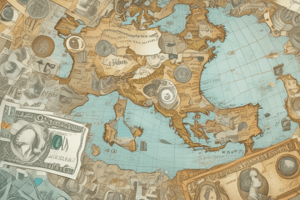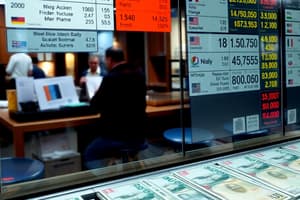Podcast
Questions and Answers
What determines the exchange rate between two currencies?
What determines the exchange rate between two currencies?
- The total amount of currency reserves held by each country
- The historical exchange rate between the two currencies
- The supply and demand for each currency, along with other economic factors (correct)
- The political stability of the countries issuing the currencies
What is currency exchange?
What is currency exchange?
- The process of converting one currency into another, allowing businesses to trade and invest across borders (correct)
- The process of converting cryptocurrencies into traditional currencies for international trade
- The process of converting foreign currency into local currency for domestic transactions
- The process of converting physical currency into digital currency for international transactions
Why is understanding currency exchange important for businesses engaged in international trade?
Why is understanding currency exchange important for businesses engaged in international trade?
- To be able to determine the best time to convert currencies and maximize profits (correct)
- To reduce the risk of currency fluctuations affecting business transactions
- To eliminate the need for currency exchange altogether
- To avoid taxes and tariffs on international transactions
What can significantly impact the exchange rate of a currency?
What can significantly impact the exchange rate of a currency?
What happens to the exchange rate when there is high demand for a currency and a limited supply?
What happens to the exchange rate when there is high demand for a currency and a limited supply?
How does higher interest rates in a country affect its currency exchange rate?
How does higher interest rates in a country affect its currency exchange rate?
What can affect the exchange rates of countries with higher inflation rates?
What can affect the exchange rates of countries with higher inflation rates?
In which scenario would you need to exchange your local currency for a foreign currency?
In which scenario would you need to exchange your local currency for a foreign currency?
How can businesses profit from currency fluctuations?
How can businesses profit from currency fluctuations?
Why is understanding the basics of currency exchange essential for businesses dealing in international trade?
Why is understanding the basics of currency exchange essential for businesses dealing in international trade?
Flashcards
Currency Exchange
Currency Exchange
The process of converting one currency into another, essential for international trade and conducted in the foreign exchange market.
Exchange Rate
Exchange Rate
The rate at which one currency can be exchanged for another, fluctuating based on supply, demand, and economic factors.
Supply and Demand (Currencies)
Supply and Demand (Currencies)
High demand and limited supply increase the currency's value; high supply and low demand decrease it.
Interest Rates Impact
Interest Rates Impact
Signup and view all the flashcards
Inflation Effect on Currencies
Inflation Effect on Currencies
Signup and view all the flashcards
Economic Indicators Role
Economic Indicators Role
Signup and view all the flashcards
Purchasing Goods/Services
Purchasing Goods/Services
Signup and view all the flashcards
Investing in Foreign Companies
Investing in Foreign Companies
Signup and view all the flashcards
Trading Currencies
Trading Currencies
Signup and view all the flashcards
Study Notes
Business Maths: Currency Exchange
Currency exchange is a crucial aspect of international business transactions. It involves the conversion of one currency into another, allowing businesses to trade and invest across borders. Understanding the principles and techniques of currency exchange is essential for any business dealing in international trade. In this article, we will explore the fundamentals of currency exchange and provide practical examples to help you grasp the concepts.
Basics of Currency Exchange
Currency exchange is the process of converting one currency into another. It is an essential component of international trade and involves buying and selling currencies in the foreign exchange market. The exchange rate is the rate at which one currency can be exchanged for another. This rate is determined by the supply and demand for each currency, as well as other economic factors.
For example, if you need to buy goods or services from a foreign country, you will need to exchange your local currency for the foreign currency. Similarly, if you need to invest in a foreign company, you will need to exchange your local currency for the foreign currency in which the company's shares are traded.
Factors Affecting Currency Exchange
Several factors can influence currency exchange rates:
-
Supply and demand: The supply and demand for a currency can significantly impact its exchange rate. If there is high demand for a currency and a limited supply, the exchange rate will be higher. Conversely, if there is a high supply of a currency and low demand, the exchange rate will be lower.
-
Interest rates: The interest rate of a country's central bank also affects its currency exchange rate. Higher interest rates cause an increase in the value of a country's currency, as they make it more attractive for investors to hold that currency.
-
Inflation rates: Inflation can affect exchange rates, as countries with higher inflation rates may see their currencies depreciate over time.
-
Economic indicators: Economic indicators such as GDP growth, unemployment rates, and trade balances can also influence exchange rates.
Practical Examples of Currency Exchange
Let's consider a few practical examples of currency exchange:
-
Purchasing goods or services: If you need to buy goods or services from a foreign country, you will need to exchange your local currency for the foreign currency. For example, if you want to buy a product from a US-based company, you will need to exchange your local currency (e.g., USD) for Euros (EUR) if the product is priced in EUR.
-
Investing in foreign companies: If you want to invest in a foreign company, you will need to exchange your local currency for the foreign currency in which the company's shares are traded. For example, if you want to invest in a Japanese company, you will need to exchange your local currency (e.g., USD) for Japanese Yen (JPY).
-
Trading currencies: Currencies can be traded like any other commodity, and businesses can profit from currency fluctuations. For example, if you believe that the value of the Euro will increase against the USD, you can buy Euros with your USD and sell them back later when the value has increased.
Conclusion
Currency exchange is a vital aspect of international business transactions. Understanding the basics of currency exchange and the factors that influence exchange rates is essential for any business dealing in international trade. By utilizing currency exchange techniques and staying informed about economic indicators, businesses can optimize their financial performance and minimize risks associated with currency fluctuations.
Studying That Suits You
Use AI to generate personalized quizzes and flashcards to suit your learning preferences.




